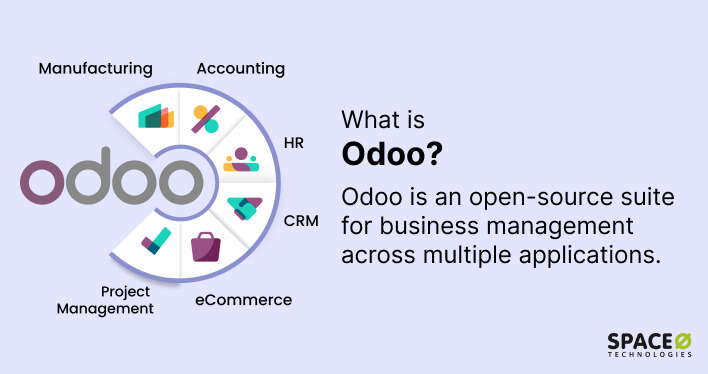Contents
What is Odoo? [Odoo ERP Meaning]
Odoo is an open-source ERP software that integrates multiple business applications like eCommerce, CRM, accounting, manufacturing, and project management into a modular platform. Odoo ERP is suitable for all sizes of companies, starting from growing startups to established enterprises.
Odoo is an enterprise resource planning software available in two versions which include:
Odoo Community Edition (OCE): A freely available open-source version providing customizable CRM, sales, inventory, and other core business tools ideal for startups and SMBs seeking flexibility on a budget.
Odoo Enterprise Edition (OEE): A paid proprietary enterprise version with advanced accounting, manufacturing, and scalability features for increased functionality at large organizations.
Now, let’s understand Odoo’s milestones.
- Global Network: More than 5,000 partners.
- User Base: 12 million users worldwide, from startups (1 user) to large enterprises (300,000+ users).
- Community Contributions: 1,500 active members contributing over 16,000 apps for various business needs.
- Awards and Recognitions:
2012 Bossie Award for Best Open Source Solution.
2018 Trends Gazelle Award in the SME category.
2021: Fabien Pinckaers was named Manager of the Year 2020 by Trends-Tendances.
- Latest Updates: Odoo 17 includes new features like WhatsApp integration, showcasing important technological advancements.
If you are looking for Odoo Implementation, customization, and development assistance, partnering with a reliable Odoo development company is advisable.
Now, let’s discuss the benefits associated with the Odoo ERP system.
What is Odoo Used For?
Odoo’s adoption has accelerated due to the strategic advantages it offers businesses. Here are the 7 benefits of choosing Odoo.
Provides Reduction in Total Cost of Ownership
The open-source model of Odoo reduces licensing and implementation costs compared to closed-source ERPs like SAP. Odoo Enterprise Edition offers capabilities comparable to SAP at a fraction of the cost.
Eliminates Risk of Vendor Lock-in for Customers
The open-source AGPL license of Odoo ensures businesses are not tied to proprietary vendor solutions. Companies have the flexibility to extend or migrate away from Odoo in the future.
Boosts Organization Productivity Through Process Integration
Integrated information flow across Odoo modules reduces manual work and errors for businesses, improving employee productivity.
Offers Flexible and Scalable Growth for Businesses
The modular structure of Odoo allows it to scale from small startups to large enterprises, growing in functionality as businesses expand. For organizations that have rapidly evolved and outgrown their current systems, seeking Odoo consulting services is recommended for a smooth and efficient expansion process.
Delivers Frequent Feature Updates to Customers
The open-source model ensures Odoo offers regular updates with new features every 6-7 months. Closed-source ERPs provide infrequent updates.
Allows Easy Expandability Through Extensive Apps Marketplace
The Odoo marketplace contains hundreds of free and paid apps allowing businesses to easily extend Odoo functionality.
Enables Uninterrupted Operations With Online/Offline Access
Odoo offers both offline and online modes. Users can work offline and data is synced when connectivity resumes. This is useful for remote regions with poor internet.
Now you know the benefits of Odoo so let’s discuss the key Odoo apps.
Odoo’s Integrated Business Management Apps
One of the major advantages of Odoo is the modular app structure that comes with a bunch of the following business apps. These Odoo apps integrate easily with each other to offer a unified experience.
Customer Relationship Management (CRM)
Manages leads, opportunities, and sales teams and tracks customer interactions with the inclusion of advanced features for sales planning, email integration, and meeting organization.
Sales Management
Handles the entire sales cycle from quotes, sales orders, delivery, and invoicing and integrates with inventory, accounting and shipping.
Purchase Management
Handles procurement, vendor management, purchase agreements, and purchasing workflow. Streamlines purchase order generation, approvals, and receiving.
Warehouse Management
Along with managing inventory, stock locations, and transfers it handles all warehouse operations like receipts, internal moves, delivery orders, and proper stock valuation.
Accounting App
Manage bills, payments, taxes, ledgers, financial reports and more. Handles AR, AP, double-entry bookkeeping, bank synchronization, and multi-currency support.
Project Management
Tool for planning and tracking tasks, timesheets, issues, projects and more. Scheduling using Gantt charts, and comfortable billing rates configuration to streamline business processes.
Manufacturing
Enables production planning, bill of materials, work orders, and capacity scheduling and covers the full production cycle from product design to output.
Website Builder
Quickly build responsive websites and eCommerce stores without coding using drag and drop editor and templating.
Point of Sale (POS)
Touchscreen point of sale interface for physical stores and restaurants. Also, handles cashier operations, payments, orders, and inventory updates in real-time.
Marketing Automation
Provides email marketing, automated campaigns, events management, surveys, and social media integration.
Human Resources (HR)
Manage employees, recruitment, payroll, expenses, leaves, appraisals, and timesheets.
After understanding these business apps offered by the Odoo ERP system. Let’s discuss the Odoo features.
8 Key Features that Make Odoo an Ideal ERP Solution
Odoo is a feature-rich ERP system designed for the needs of modern businesses. Here are the key features offered by Odoo.
Drag & Drop Interface
The Odoo software uses an interactive drag-and-drop user interface for ease of use. Minimal technical knowledge is required to operate and customize Odoo.
Mobile Access
Native Android and iOS apps allow employees to access and manage Odoo data remotely from mobile devices. Real-time information is available on the go.
Cloud Deployment
Odoo is available on both on-premise and cloud deployment modes. The SaaS model reduces infrastructure costs.
Access Control
User-level access controls and rules engine in Odoo ensure data security and privacy across organizations. Sensitive information can be restricted.
Multi-company Support
Odoo supports the management of multiple companies within the same database. This is useful for holding companies with multiple subsidiaries.
API and Customization
Powerful API allows easy integration of Odoo with external software. Odoo is highly customizable to meet specific business needs.
Odoo Studio
Odoo Studio is an integrated development tool for building custom Odoo apps without coding. Odoo became one of the largest business app stores due to this open-source development model.
Odoo Marketplace
The Odoo marketplace contains 40k+ community apps, both free and paid, developed by partners to extend Odoo capabilities.
In conclusion, Odoo is an open-source ERP packed with business applications, offering an affordable and flexible solution that can be adapted to the unique needs of businesses. With its modular structure, mobile access, and regular updates, Odoo provides an agile platform to streamline business processes. Choose Odoo for efficient business management.




